|
Safe Accessories
Customizing Your Safe To Your Specific Needs
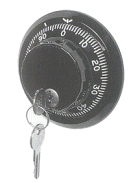 Choosing
the right size, level of protection, and type of safe is only
the beginning. Choosing
the right size, level of protection, and type of safe is only
the beginning. 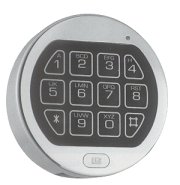 Now
comes the really confusing part — deciding what options
and configurations best suit your your particular needs. Now
comes the really confusing part — deciding what options
and configurations best suit your your particular needs.
Below we briefly describe a few
of the options available to you. There are literally hundreds
of others not covered here. Allied's professionals can help
you sort through the maze of possibilities to help you arrive
at just the right safe and options to suit your needs. Click
here to request more information or call an Allied Safe professional
today.
Mechanical Combination locks offer
one very simple advantage — price. These locks are less
expensive and chances are, if you are buying this safe for
your home, a mechanical combination lock will suit your needs
just fine. However, if you are buying a safe for your business,
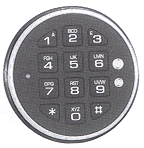 consider
the benefits of upgrading to an electronic or digital keypad
lock. Either type will easily replace most mechanical combination
locks. Electronic locks offer several advantages: consider
the benefits of upgrading to an electronic or digital keypad
lock. Either type will easily replace most mechanical combination
locks. Electronic locks offer several advantages:
- Easy combination changes
- Preset number of incorrect tries triggers 15 minute penalty
"lockout"
- Different combinations available for different users
- When you reclose the safe, you know its locked (no dial
to spin)
Just as with mechanical combination locks, digital keypad
and electronic safe locks are both U.L. listed. Additionally,
digital combination locks can be coupled with internal modular
alarm systems inside the safe to assure you of maximum protection.
Allied offers 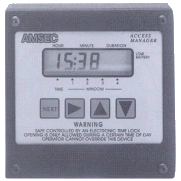 several
high quality access control management systems. Access control
systems make it easy to monitor users. You can precisely audit
who and when accessed the safe at any time. several
high quality access control management systems. Access control
systems make it easy to monitor users. You can precisely audit
who and when accessed the safe at any time.
Access control management systems come in two basic varieties,
although each variety offers its own lengthy list of options.
Basic Access Control systems work in concert with your digital
or electronic combination lock to limit and record 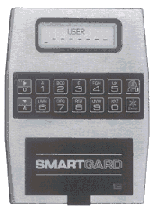 access
times and users. If access is attempted during a time of day
that isn't preprogrammed, the safe cannot be opened. However,
the attempted access is recorded to protect you from internal
theft. Like digital combination locks, access control systems
can also be set to trigger silent alarms when unauthorized
users attempt to access your system. Access control systems
provide outstanding deterrence against internal theft. Each
access to the safe can be fully documented. access
times and users. If access is attempted during a time of day
that isn't preprogrammed, the safe cannot be opened. However,
the attempted access is recorded to protect you from internal
theft. Like digital combination locks, access control systems
can also be set to trigger silent alarms when unauthorized
users attempt to access your system. Access control systems
provide outstanding deterrence against internal theft. Each
access to the safe can be fully documented.
More sophisticated access control systems also act as locks.
You can preset the time of day access is allowed, and program
in as many as 60 different users enabling precise tracking
of safe access attempts. Many of our systems feature "deposit
control" — electronic auditing of who, when, amount
of deposit, and even the ID of the deposit bag! These systems
are simply the best protection money can buy and offer terrific
value for clients who keep large of amounts of cash on-hand.
Top of Page
Second only in importance to the type of locking system you
use is how you are going to internally configure your safe?
How many shelves or drawers do you need? What about deposit
slots? What about an internal alarm? An Allied Safe professional
can help you narrow down all the choices to precisely what
will work best for you.
Our professionals will work closely with you and will ask
you many questions. 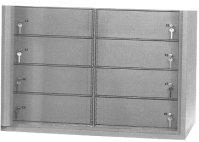 Our
professionals will look at such variables as location, number
of authorized users, types of documents, cash or valuables
to be stored. They may ask questions about the daily routines
of your business. For example, perhaps your store has several
cashiers, each responsible for their own cash drawer. For
these types of businesses, interior lockers, each with its
own key are often an excellent choice. Our
professionals will look at such variables as location, number
of authorized users, types of documents, cash or valuables
to be stored. They may ask questions about the daily routines
of your business. For example, perhaps your store has several
cashiers, each responsible for their own cash drawer. For
these types of businesses, interior lockers, each with its
own key are often an excellent choice.
Other concerns such as important documents you want kept
in the safe, but away from the prying eyes of other authorized
users, may point to configuring the safe with a separate locking
drawer.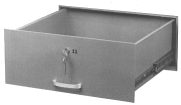
How often are deposits made, and how much cash is kept on
hand? If deposit are small, but fairly frequent, then an external
deposit slot may be adequate. However, since these external
slots can also be more prone to attack, then perhaps an internal
deposit slot is better suited to your needs, especially if
you keep large amounts of cash on hand.
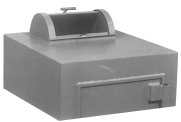 These
are just a few examples of the kind of information an Allied
Safe professional will use to help determine the kinds of
options that are best for you. Over the past 50 years, Allied
Safes has worked with thousands of businesses and homeowners
to help each get the most protection for their security investment
dollar. Contact an Allied Safe professional today and take
the worry out of getting just the right safe. These
are just a few examples of the kind of information an Allied
Safe professional will use to help determine the kinds of
options that are best for you. Over the past 50 years, Allied
Safes has worked with thousands of businesses and homeowners
to help each get the most protection for their security investment
dollar. Contact an Allied Safe professional today and take
the worry out of getting just the right safe.
Top of Page
|



